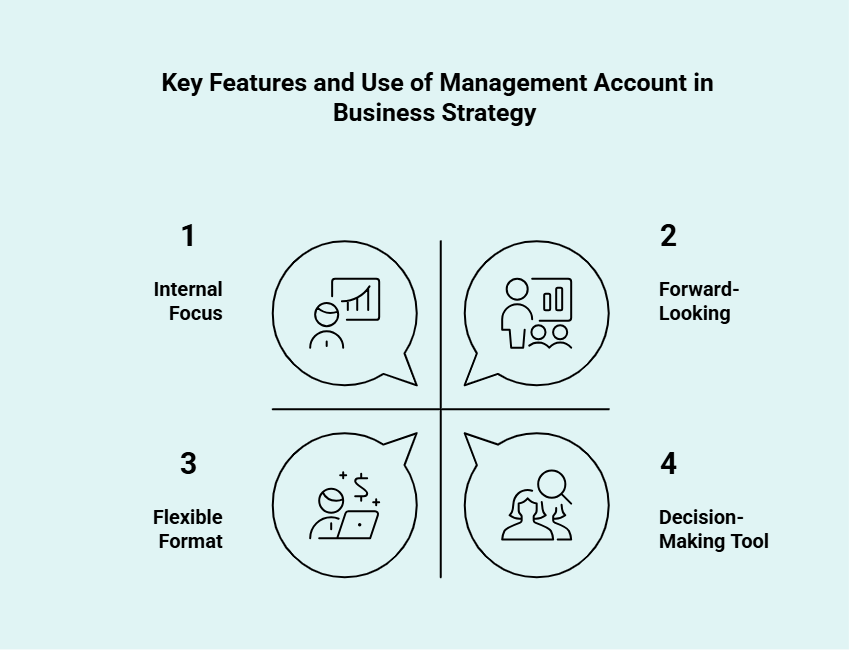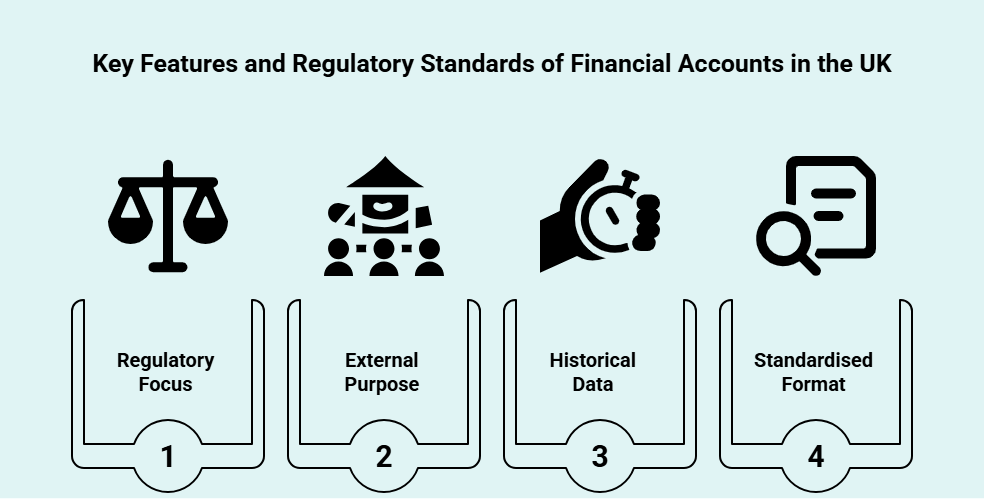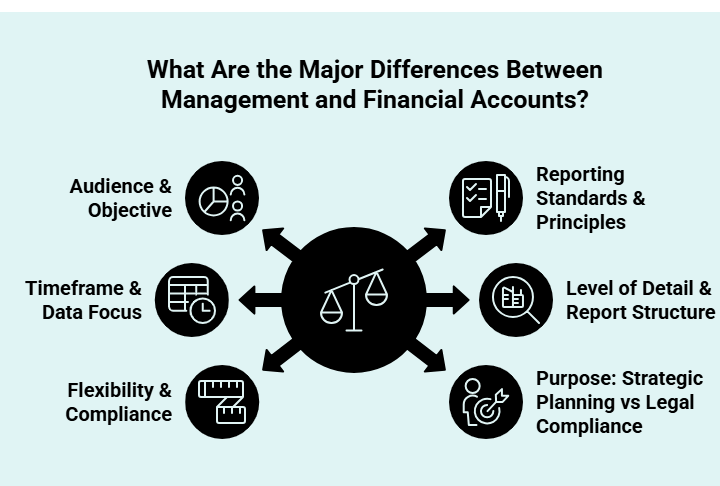Management Accounts vs Financial Accounts: What’s Best?
Jul 2025
You’re tracking expenses, reviewing reports, and trying to make sense of your numbers, but something feels off. Should you be using management accounts or financial accounts? Are you over-reporting, under-analysing, or missing key insights?
The truth is that both management accounts and financial accounts serve different purposes. One helps you run the business on a day-to-day basis. The other keeps you compliant and investor-ready. Knowing the difference between them is essential for making confident, well-informed decisions.
In this blog, we’ll break down how they differ, when to use each and which one makes the most sense depending on your stage and goals.
What Are Management Accounts?
Management accounts are internal financial reports designed to help business leaders make smarter, faster decisions. Unlike financial accounts, they’re not bound by external regulations. These reports focus on current data, forecasts, and trends, providing a real-time view of the business’s performance. They're typically produced monthly or quarterly to guide planning, budgeting, and strategy.
Key Features and Use in Business Strategy

- Internal Focus: Management accounts are created for business owners, managers, and department heads to provide them with accurate financial information. They support day-to-day operations and long-term planning.
- Forward-Looking: These reports often include forecasts, budgets, and performance metrics, helping companies anticipate challenges and allocate resources effectively.
- Flexible Format: There’s no fixed template. Businesses can tailor reports to include key performance indicators (KPIs), cost breakdowns, or segment performance, depending on their specific goals.
- Decision-Making Tool: Management accounts highlight areas of strength and concern, enabling faster, data-backed decisions at every level of the business.
What Are Financial Accounts?
Financial accounts are formal records prepared to present a company’s financial performance and position to external stakeholders. These include the income statement, balance sheet, and cash flow statement, each providing a snapshot of the business's financial performance over a specified period. Unlike internal reports, financial accounts follow strict regulatory standards to ensure accuracy and comparability, enabling easy comparison across businesses and time periods.
Key Features and Regulatory Standards in the UK

- Regulatory Focus: In the UK, financial accounts must comply with Financial Reporting Standards (FRS) and, where applicable, the UK-adapted versions of Generally Accepted Accounting Principles (GAAP). These ensure consistency, transparency, and compliance with legal requirements.
- External Purpose: These accounts are designed for shareholders, tax authorities, lenders, and other external users, helping them evaluate the business’s past performance and current financial health.
- Historical Data: Financial accounting focuses on the past. It captures and summarises actual transactions from a specific accounting period.
- Standardised Format: The reporting structure is fixed and must follow official templates, making it easier for auditors and regulators to assess accuracy.
What Are the Major Differences Between Management and Financial Accounts?

While both are crucial for financial control, management accounts differ from financial accounts in purpose, users, and how the data is used. Let’s break down the key differences between management accounts vs financial statements to help you decide which type of accounting best serves your current goals.
1. Audience & Main Objective
Management accounts serve internal users, such as business owners and department heads. These reports help guide the company’s internal decision-making, offering tailored data for planning, performance tracking, and cost analysis.
Financial accounts, by contrast, are designed for external stakeholders, including investors, creditors, and tax authorities, whose interests lie in the company's overall financial health. The primary objective is to present a clear and consistent view of past performance over a specific period.
2. Reporting Standards & Principles
No regulatory body binds managerial accounting reports. A management accountant can tailor reporting to what is most useful for the business, making it agile, flexible, and highly relevant to evolving strategies.
Financial accounting must comply with accepted accounting principles, such as GAAP or the FRS in the UK. These standards, overseen by bodies such as the Financial Accounting Standards Board, ensure that financial accounting reports are reliable and comparable across different entities.
3. Timeframe & Data Focus
Management accountants integrate both past and forward-looking data. These reports may include forecasts, budgets, and key performance indicators (KPIs), enabling teams to take real-time action and prepare for upcoming financial challenges with clarity.
Financial accountants focus on documenting and summarising historical financial transactions, capturing what happened in the past to meet compliance and auditing needs.
4. Level of Detail & Report Structure
Managerial reports are detailed and often broken down by product, region, or cost centre. This level of detail enables leadership teams to optimise spending, assess profitability, and inform strategic decisions at the operational level.
Financial reports, however, are typically high-level and aggregated, such as income statements and balance sheets, providing a top-down view that supports external trust but not granular analysis.
5. Flexibility & Compliance
Management accounting is built for adaptability. It allows for custom metrics, evolving structures, and reporting that aligns with the needs of different departments or business units, which is especially useful in corporate finance and other related fields.
Financial accounting is rigid by design. Reports must follow legal templates, submission timelines, and audit standards. Accuracy and consistency are critical for external verification.
6. Purpose: Strategic Planning vs Legal Compliance
A certified management accountant delivers operational clarity using numbers to guide growth, efficiency, and execution across departments.
A certified public accountant, on the other hand, ensures compliance with and accuracy in regulatory matters. Their work is audit-ready and focuses on external trust.
How to Choose the Right Approach for Your Business?
Both financial and management accounts serve distinct purposes. Financial accounting ensures you stay compliant with regulatory standards and credible with external stakeholders, while management accounting gives you control over internal performance and future planning. For most businesses, using both together provides a complete financial picture. Let's discuss these things in the following sections.
When Can Management Accounts Drive Better Decisions?
Management accounts step in when your focus shifts inward toward efficiency, forecasting, and real-time insight. Created by a management accountant, these reports support the company’s internal decision-making. Here’s how they can drive better decision-making:
- Customizable reports tailored to your business’s specific needs.
- Focus on KPIs, budgets, and cost analysis to guide business decisions.
- Real-time insights enable quick adjustments and course corrections.
- Helps adapt strategies in dynamic environments to keep up with changes.
- Supports growth across departments with clear financial visibility.
When Are Financial Accounts Required?
Financial accounts become crucial when dealing with external stakeholders, such as investors, lenders, and tax authorities. These records, prepared by a certified public accountant, follow accepted accounting principles and comply with regulatory standards to ensure transparency and trust. Here’s why financial accounts are crucial:
- Compliant with regulations like GAAP, ensuring legal adherence.
- Provides a clear financial position through statements like the income statement and balance sheet.
- Required for tax filings, audits, and funding applications.
- Builds credibility and trust with external parties (investors, lenders).
- Reflects overall business performance over a given period.
Need Clarity on Your Numbers? Let Accountancy Cloud Handle It!
Understanding the difference between management accounts vs financial statements is just the beginning. At Accountancy Cloud, we help startups and high-growth companies turn financial data into fundamental business strategies without the overhead of an in-house finance team.
From real-time management reports to investor-ready financial statements, our expert team and intelligent platform make it easy to stay in control, impress stakeholders, and plan with confidence. You also get insights tailored to your stage, whether you're managing cash flow, raising funds, or preparing for an exit.
Want finance that works like a growth engine? Reach out to Accountancy Cloud, and let’s build your future numbers first.
Conclusion: Which One Is Better?
When comparing financial accounts vs management accounts, the question isn’t which is better; it’s which serves your current objective. Financial accounts are crucial for ensuring legal compliance, fulfilling tax obligations, conducting audits, and attracting investors. They follow generally accepted accounting principles and offer a standardised view of your financial health over a specific period. Without them, your business can’t meet its statutory obligations or gain external credibility.
On the other hand, management accounts play a crucial role in daily decision-making, cost control, and future planning. Prepared by a certified management accountant, these managerial accounting reports give you the power to course-correct quickly, allocate resources efficiently, and stay competitive. They’re not bound by rigid standards, which makes them dynamic, adaptive, and deeply aligned with your business strategy.
The most successful companies use both because when compliance meets clarity, financial leadership becomes your biggest asset.
Frequently Asked Questions
Are management accounts compulsory in the UK?
No, you are not required by law in the UK to prepare management accounts. These accounts are made for internal use only. They help businesses and their people make informed choices. Management accounts are different from financial accounts. They do not need to use any set or regulated accounting standards.
Can a business use both types of accounts together?
Absolutely. Using both financial accounts and management accounts provides business owners with a comprehensive view of economic management. This way, they can meet the needs of external stakeholders. At the same time, they get important insights that help with daily work and planning for growth.
How often should management accounts be prepared?
Management accounts are typically compiled every month. This can vary depending on the specific needs and available company resources. These reports help ensure that relevant information reaches the people who make decisions. With this, they can receive updates on time and plan effectively to run things smoothly.
Which is better for small businesses: management accounts or financial accounts?
Small businesses utilise management accounting to obtain timely and clear updates. This helps them make better choices each day. However, they still need to maintain financial accounts to comply with regulations and report to relevant authorities. By using both, they ensure the business’s financial health and also comply with necessary regulations. This is a good way to keep strong financial health for any small business.
Is Managerial Accounting More Difficult Than Financial Accounting?
Managerial accounting requires detailed and flexible reports for individuals within a company. This makes it more complex. On the other hand, financial accounting adheres to established rules and is generally less complex. Both, however, need skilled people. Managerial accountants often have advanced certifications.
What are the similarities between financial accounting and management accounting?
Both branches give detailed financial information. They help you see how a company is doing in specific periods. Financial accounting consistently uses the same set of formats. On the other hand, management accounting can be adapted to meet the needs of the team within the company. Both types are different but share some big ideas. They each play a part in helping people learn more about money within the company.

Educational content just for startups. As a member, you’ll get unlimited access to an extensive range of guides, blogs and advice to help you run and grow your business.


